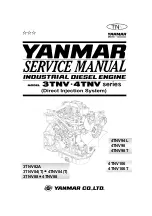
5-1
Chapter 5 ENGINE OIL
Properties of engine oil
and its influence on
engine performance
Engine oil lubricates the engine and greatly influences
the performance and durability of the engine.
Distinctive differences of engine oil from other oils are
that engine oil lubricates hot sections adjacent to the
combustion chamber and is strongly affected by the
combustion products. Engine oils, therefore, are
required to have cooling, sealing, deterging, and neu-
tralizing abilities in addition to the lubricating function.
Because diesel engines especially produce acid prod-
ucts such as sulfuric acid due to the sulfur content of
the fuel and soot due to imperfect combustion that
contaminates oils, engine oils for diesel engines must
have capabilities not only to withstand severe lubricat-
ing conditions, but also to neutralize acid products to
prevent them from agglomerating and depositing.
The function of performance required for engine oils is
shown below:
• Good detergent dispersability for high temperature
applications, for preventing contamination and dep-
osition of sludge and soot.
• Excellent acid neutralizing capability to inhibit oxi-
dization due to sulfur content of fuel.
• Good oxidation stability that withstands long hours
at high temperature.
• Appropriate viscosity to maintain lubricity and low-
temperature startability.
• Good rust and corrosion resistance to water.
• Good foam resistance to prevent the lubricating
quality from lowering due to oxidation.
Main properties of engine
oil
Dispersibility
Engine oil performance degrades through oxidation
and also by external causes. Acid products such as
sulfuric acid due to sulfur content of fuel become insol-
uble sludge. Incomplete combustion of fuel creates
soot in oil.
This sludge and soot in oil are accumulated in the
groove or on the inner surface of piston rings and will
result in seizure or wear of the piston rings, or it will
lower heat transfer of the piston rings drastically. Dis-
persibility of engine oil is to disperse sludge and soot
in oil in order to prevent it from depositing.
Acid neutralization ability
Compared to gasoline fuel, diesel oil produces more
sulfuric acid due to the high sulfur content in the fuel
during combustion, and the sulfuric acid contaminates
the oil. To neutralize the sulfuric acid, engine oils are
required to have excellent neutralizing ability. Engine
oils for diesel engines usually contain a detergent
metal agent that has high neutralization ability.
Viscosity
Oils flow with difficulty at lower temperatures, and flow
smoothly at high temperatures. The oil viscosity is a
property that indicates resistance to flow. This prop-
erty of viscosity directly relates to low-temperature
startability, lubricity, fuel consumption by friction loss,
and oil consumption.
For identification of an oil's viscosity, SAE (Society of
Automotive Engineers) numbers are widely used.
(The viscosity of engine oil identified by the number of
SAE shows the thickness or thinness of viscosity at
particular temperature.)
The property of engine oils is identified not only by vis-
cosity number that shows thickness and thinness of
viscosity at particular temperature, but also by viscos-
ity index that shows the changes in oil viscosity with
changes in temperature. When the viscosity index of
oil is high, it means the change of viscosity due to
temperature is small.
The viscosity index (VI)-100 of oil is generally applied
to diesel engine oil. Oils indicated by, for instance, VI-
100 are called single grade oil, which fall under one
range of viscosity. There are also oils called "multi-
grade oil" for which viscosity falls under two ranges of
viscosity and they are indicated by, for instance, SAE
15W-40, which means that at a lower temperature, the
oil has 15W grade, and at a higher temperature it has
a 40W grade. ("W" indicates the suitability of oil for
colder temperature). In other words, 15W-40 indicated
on oil demonstrates SAW15 grade of viscosity at a
lower temperature and 40 grade viscosity at a higher
temperature.
















































